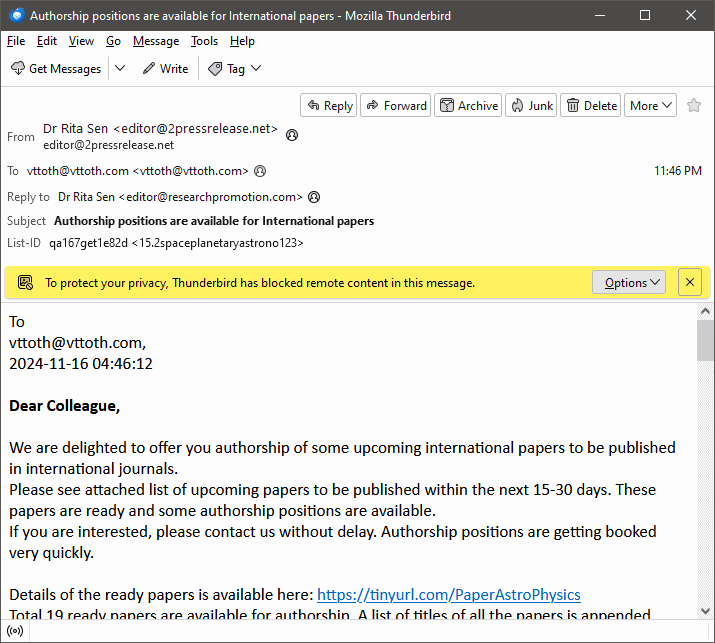For many years now, I’ve been receiving regular invitations from low-quality, predatory journals to contribute papers.
Needless to say, I didn’t.
But today, it reached a new low. I was offered, in exchange for the princely sum of $30, “authorship positions” in any one of a set of 19 papers.

Holy macaroni. Or whatever.
The esteemed journal in question that is inviting me to throw away any semblance of scientific ethics just to have my name appear… somewhere, calls itself the International Astronomy and Astrophysics Research Journal. Several paragraphs later in the e-mail I learn the…
List of Ready Paper
1. Advances in Dark Energy Research: Understanding the Mystery of the Accelerating Universe
2. Progress in Dark Matter Research: Bridging Observations and Theoretical Insights
3. A Review on Advances in Gravitational Waves Research
4. Recent Advances in the Cosmic Microwave Background Research: A Review
5. Galaxy Formation and Evolution: Progress in Recent Research
6. Computational Astrophysics Research: Review of the Recent Progress and Future Directions
7. Heavy-Ion Studies Research: Current Progress and Future Directions
8. Advances and Future Directions in Cosmic Ray Research: A Comprehensive Review
9. Gravitational Lensing: Review of Recent Progress and Future Directions
10. Advances in Black Hole Research and Future Directions: A Review
11. Exoplanet: Recent Developments and Future Directions: A Review
12. Recent Advances in Galaxy Formation Research and Future Developments
13. Galaxy Clusters: A comprehensive Review of Recent Developments
14. Recent Advances and Future Directions of Solar Physics Research
15. Recent Advances in Astrophysical Magnetism and the Interstellar Medium Research
16. A Review of Interstellar Black Holes: Navigating the Invisible
17. Recent Advances in Star Formation Theories: A Comprehensive Review
18. A Review of Recent Progress in Supermassive Black Holes and Galaxy Formation Research
19. Advances in Neutron Stars and Pulsars Research: Recent Progress and Future Directions
Yes, I’ve said it before, scientific publishing is in a crisis: flooded with low quality research, in need of qualified reviewers, stuck between two contradictory business models (subscription-based vs. open access publishing) and facing a deluge of for-profit, predatory publishers. But this represents a new low even within that dismal landscape.
Looks like the predators might have used AI to permute phrases and generate a multitude of titles?
I don’t know if the “papers” are AI-generated or just written by students in low-paying sweatshops. Possibly a combination of the two. But it really demonstrates how bad things really are in the world of scientific publishing. Not so much for experienced researchers, but students, especially students from cultures that put more emphasis on respect for authority and less on independent critical thinking: It is these students who spend real money to get their work published in predatory journals, it is these students who read such low-quality output and accept it as legitimate science.
I once asked some colleague who switched from “aspiring physicist” career to our dull enterprise programming, about the motivation of this turn. He said “you see, when I wrote PhD work and they said I should write some review myself and give it to reviewer just to sign, I thought it doesn’t look exactly like proper science”. But I thought this course of things is limited to, so to say, “underdeveloped” countries :)
Though this letter seems to be from India, so perhaps things are not that bad still. On the other hand a handful of my classmates are working in physics and some on international level and I do believe they are not of that “low grade” (though of course it is not easy for me to judge properly). On the country level we of course have quite a number of such “journals for everyone who want to publish anything scientific-like”.
So perhaps things are not that dark. Yet. But perhaps big science is heading to some serious change (towards self-publishing, openness etc, similar to how it happens in IT) – though it is difficult to understand how scientists will support themselves in such case. Perhaps it will be rather step back, to the situation of 17-18 century.